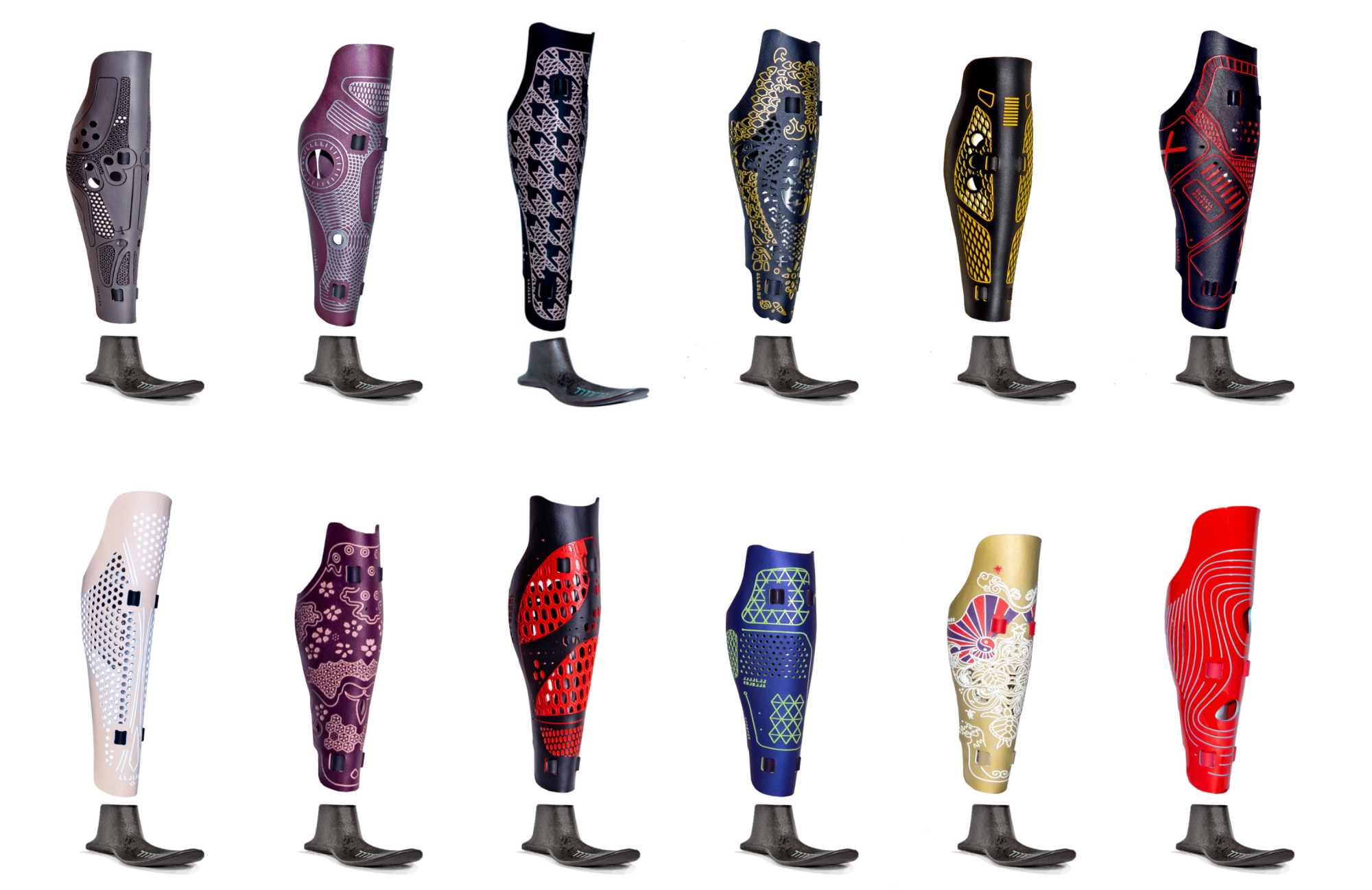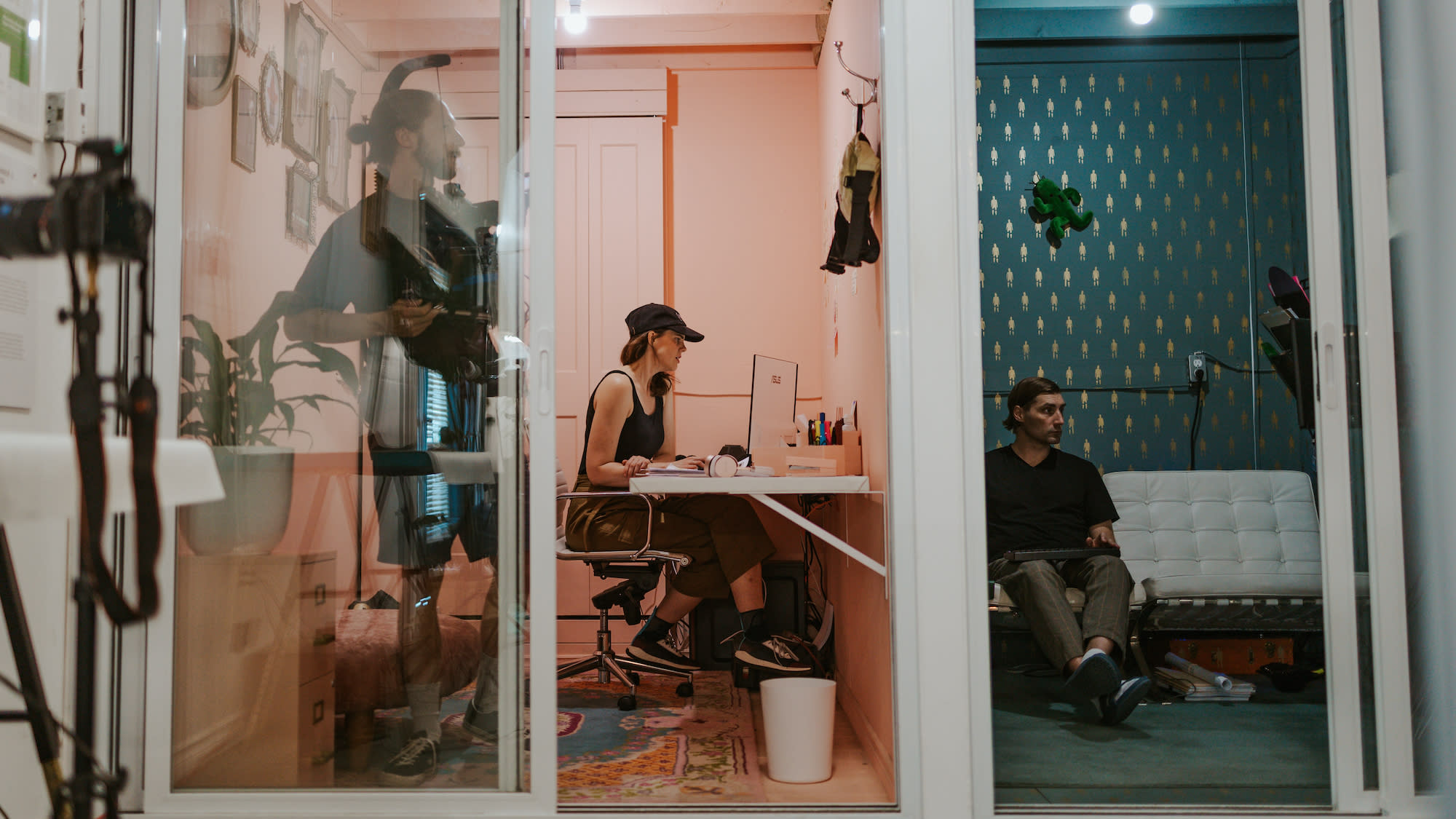Alleles Design Studio prosthetics fuse fashion with function

Alleles Design Studio prosthetics fuse fashion with function
A Victoria couple is refashioning the prosthetic design industry
Prosthetic legs have long been regarded utilitarian devices for helping people who have had amputations move around. There hasn’t, in other words, been much room for personality.
That always bothered McCauley Wanner.
“Industrial design is kind of a weird industry; it's more engineer-based,” Wanner says. “I just wanted to figure out if there’s a way to take a fashion approach to the industry.”
As a graduate student at the University of Calgary, Wanner’s thesis project looked into the gap within the medical prosthetics industry that fulfilled function, but not fashion or individual aesthetics.
Together with her partner Ryan Palibroda, she created Alleles Design Studio to help clients create their perfect prosthetic fit with customized designs that looked and felt beautiful.
“With medical [products], you always get what you get, because it technically works for you,” Palibroda said.
”We wanted this to be something that people would shop for, and they’d find something that suits their personality.”
But the decision to take a leap of faith into the business world didn’t come easy to the pair. Rather it took several years of mulling, wondering, and imagining the possibilities for Wanner and Palibroda to finally realize the concept into a physical product.

A sample of the options Alleles displays on its website.
“I just thought [Wanner’s thesis] was one of the best ideas I’d ever seen. But it did take us a couple years after we finished school to really get into treating it like a business,” Palibroda said.
So in 2015, the couple moved to Victoria to establish their roots for Alleles Design Studio. BC’s capital, at the time, was the most affordable option. With a plethora of commercial spaces available to lease, they first chose to establish themselves at a studio space in Market Square. The couple was also able to find an apartment to rent for just $800—a pipe dream in today’s market.
And though the pair prefers a faster, metropolitan lifestyle, the city’s sleepier vibe allowed them to be more productive. “Which is why we ended up leaving Montreal, because it's like, all people do is go out and socialize and drink,” Wanner said. “Does anyone want to, like, get anything done?”
Once here, they set up shop and established themselves as one of the only options in North America for affordable, consumer-friendly, and fashion-forward prosthetics. Personality abounds in the products Alleles creates: from florals to skulls to circuit boards and more, the prosthetic legs carry patterns that are not meant to be hidden beneath a pant leg, but rather supposed to be shown off to the world.
Fashioning a future
Alleles Design Studio doesn’t identify itself as a prosthetics company. Instead Wanner and Palibroda feel that at the core of the operation they are simply what their name suggests: a design studio.
This is because the company doesn’t create prosthetics themselves, but rather builds customized skins with different artwork and patterns for consumers to wear. These products and designs go straight to the clientele, with the prices listed directly on their website.
“That is not how the prosthetic industry works; they do not like that,” Wanner said.
“When we first started, we had a lot of big companies calling us,” said Palibroda, “They’re like, ‘You guys need to not list your prices, people can’t know what you’re billing or what they’re paying for.’”
Palibroda and Wanner decided to do the opposite, and their choices as a startup forced larger companies to drive down their own prices in order to stay competitive.
When the couple were first starting out, they priced their designs at $350 to $450 CAD, while their main competitor—a company called ‘Unyq’ that followed suit about three months after Alleles was the first, globally, to market this type of product—listed their prices at around $2,500 USD, according to Palibroda. Since then, Alleles has upped their prices by a few hundred dollars, while their competitor lowered theirs. (Unyq’s prices are not listed on their website, and these price comparisons are based on Wanner and Palibroda’s testimonies.)
“If people are going to have a device their whole life, they want to identify with this thing that’s actually a part of their identity, their body,” Wanner said.

Wanner and Palibroda at work. Photo: Camille Candia (Submitted)
“In more than a way that’s just purely functional,” Palibroda added.
Wanner and Palibroda add that they feel fortunate to have their business in an online format with a global clientele base, especially given the circumstances of the past two years.
Each wave of the pandemic brought an onslaught of unpredictable gains and losses from every country that their products were available in. No matter how proactive they were, trends emerged of either customers getting hit with supply chain shortages or unpredictability in raw material delivery times.
“We were extremely proactive, maybe to the point of a little bit of overkill,” Palibroda said. A certain level of foresight was necessary, given what their suppliers were telling them. “[Our suppliers] were like, ‘We can’t tell you how much it’s going to be, we don’t know when it’s going to be, it could be 10 times the price by the time you get it,’” he said.
Now almost two years later, Wanner and Palibroda say they’re doing better—and on the bright side they now have a mountain of materials that’s finally been delivered.
Companion and collaborator
Wanner and Palibroda’s relationship doesn’t end with the workday; they’re partners in business and in life.
“Starting a business, you don’t have work life balance anyways,” Palibroda said, with Wanner chuckling in the background, “But at least we get to see each other.”
Before starting Alleles in Victoria, the pair lived and worked from Montreal but were barely able to see one another despite living together. Now they see each other all day, every day, and that’s part of why they’ve been so successful.
“We both see exactly what each other is working on all the time and when someone’s struggling, the other person pulls the weight at home,” Wanner said.
Not everyone has seen their business in the same positive light.
Wanner’s thesis almost didn’t get approved by her advisors at the University of Calgary due to ethical qualms. They questioned her attempt to bring something as frivolous and commercial as fashion design to a sensitive medical issue.
Wanner, obviously, sees it differently.
“It’s not like we’re rolling in money; we’re just trying to create an option,” she said.
“We’re making a product that adds value to people, that makes them feel better about themselves. If no one wants it, then the market decides—and we let people who have disabilities decide if they want it,” adds Palibroda.
Wanner sees hope in the future with more and more designers and companies looking to create inclusive design, and the couple is determined to help push that wave of change forward with Alleles in the years to come.
“Fashion and representation is still new. It’s only in the last five years that we have seen advancements with people with Down Syndrome, or little people, or amputees on runways,” Wanner said. “That did not happen before five years ago.”
Additional Info
Media Contact : Capital Daily
Source : https://www.capitaldaily.ca/news/alleles-design-studio-prosthetics